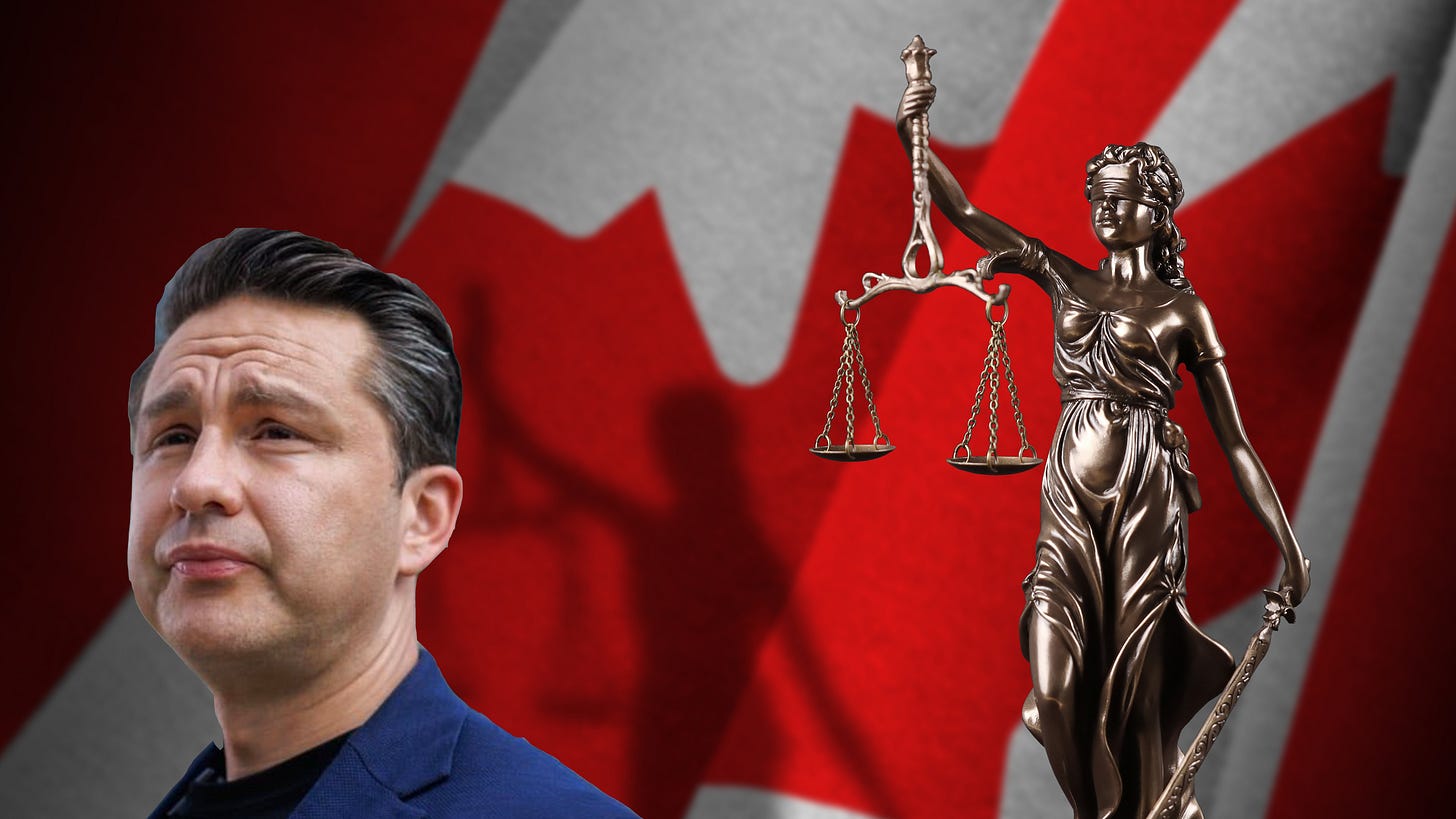Poilievre’s Imported Politics: Castle Laws and the “Three Strikes” Fantasy
Poilievre is busy importing failed U.S. crime policies, all to scrape through a leadership review — not to actually lead Canada
Poilievre’s latest hard‑edged policy push might look like he is still on the campaign trail. And in a sense he is, but it isn’t the campaign for a general election.
It’s the campaign to survive a leadership review.
Whether it is his insistence on importing “castle doctrine,” talking up so‑called Liberal “catch and release,” or bringing back rigid mandatory minimums or so called “three strikes” laws that take away a judge’s discretion to weigh the circumstances of a case, the pattern is clear.
These aren’t serious law‑and‑order solutions.
They’re wedge issues tailored to poll well with the people who matter most to him right now:
Conservative Party members and insiders who get a say in his future.
The Leadership Review Context
Poilievre knows his hold on the party isn’t guaranteed. He needs to show Conservative members that he is their uncompromising fighter on crime, even if the policies won’t withstand Canadian law. This is especially obvious when the Supreme Court has been clear about proportionality and individualized sentencing:
Mandatory minimums have repeatedly been struck down. In R v Smith (1987) the Court found a seven‑year minimum for importing narcotics to be cruel and unusual. In R v Nur (2015) it struck down the three‑year minimum for possession of a loaded, prohibited firearm. In R v Lloyd (2016) it held that a one‑year minimum for certain drug offences was unconstitutional. More recently, R v Hills (2023) invalidated a four‑year minimum for firearm offences. Restoring blanket minimums would collide with this line of cases.
Castle doctrine goes even further off‑side. In the U.S., this idea is intertwined with the Second Amendment and a broader “stand your ground” culture. Canada does not have a constitutional right to bear arms. Here, section 34 of the Criminal Code already allows self‑defence using reasonable force — including lethal force when necessary — based on a proportionality test and a list of context factors. That framework was deliberately modernized by Bill C‑26 (2012) under the Harper government, clarifying both self‑defence and defence of property. Poilievre was a Conservative MP at the time and who voted in favour of passing.
Poilievre has also said on the campaign trail that he is prepared to use the notwithstanding clause to push parts of his agenda. That would be unprecedented at the federal level and aimed at getting around obvious Charter problems rather than solving public‑safety ones.
Notwithstanding the Charter: How a Conservative Government Could Reshape Canada’s Gun Laws
From Unthinkable to Plausible
But again, the point isn’t passing durable common-sense laws.
The point is firing up his base so that he can survive a leadership review.
Why “Castle Doctrine” is Especially Troubling
The U.S. experience on the books is not exactly subtle: expanding legal immunity to use lethal force correlates with more killings, not fewer.
Florida’s “stand your ground” law was associated with a 24 percent rise in homicides and a 32 percent rise in firearm homicides after enactment, relative to trend and comparison states.
Nationally, states adopting stand‑your‑ground laws saw 8 to 11 percent increases in homicide and firearm homicide. Some states experienced larger, persistent jumps.
Multiple analyses show racial disparities in how “justifiable” homicides are determined. White shooters killing Black victims are more likely to be deemed justified than the reverse.
Trade war notwithstanding, Canada doesn’t need these kinds of imports.
Canada’s Criminal Code Section 34 already lets people defend themselves when necessary, and it bakes in proportionality. In fact, the Lindsay, Ontario case that Poilievre has been grandstanding on actually shows the Canadian system working as designed:
police lay charges on the available facts;
courts test them against section 34’s reasonableness standard;
proportionality is enforced.
Castle doctrine would strip away those safeguards and invite escalation, which in turn would increase the burden on existing law enforcement activities.
Sidebar: The Lindsay, Ontario Case
The recent case in Lindsay, Ontario, which Pierre Poilievre has seized on, actually demonstrates the Canadian system working as intended.
Police charged a homeowner after an alleged intruder was assaulted. At first glance, it looked like a simple home invasion story. But our laws are clear: force in self-defence must be reasonable and proportionate. That is why police investigate thoroughly before leaving judgment to the courts.
It’s possible that investigators uncovered evidence suggesting the force went too far — for example, if the assailant was known personally to the homeowner, if there were signs the homeowner had the opportunity to retreat but chose not to, or if other facts complicated the claim of necessity.
Police cannot disclose these details publicly while charges are before the courts. That doesn’t mean the system failed. On the contrary, it shows the checks and balances of Canadian law are functioning: police gather the facts, the Crown tests them in court, and a judge or jury weighs them under section 34’s reasonableness standard.
It’s also important to be clear: lethal force can and does get used in Canada under this same framework — more often than many people might realize or be comfortable with. The law recognizes that in some circumstances, lethal force may be reasonable and necessary. These same rules of proportionality guide not only homeowners in self-defence, but also police officers when deciding how much force they can lawfully use. The principle is consistent: actions must be reasonable in the circumstances, judged after the fact by the courts.
This is precisely why Canada doesn’t need an American-style castle doctrine. The law already protects people who act reasonably in self-defence while ensuring proportionality and fairness are upheld.
The Bill Canadians Would Pay
Twice the death at ten times the cost — that’s the reality of copying failed U.S. crime policy.
None of this is free.
Federal incarceration already costs over $114,000 per inmate per year on average. According to the Parliamentary Budget Office (PBO) expanding capacity costs six figures per prison bed, and much more for some women’s facilities. A prison‑heavy agenda would add billions in operating and capital costs — exactly at a time when Canada can least afford performative policy.
And because blanket minimums keep failing in court, taxpayers also eat the massive litigation costs.
Benjamin Perrin’s Warning
Of course we’ve seen this playbook before. And the funniest part? One of the loudest voices ripping it to shreds is Benjamin Perrin — Yes that Benjamin Perrin, Harper’s own former crime advisor, now a UBC law professor. In 2025 he tore into the “three strikes” gimmick Poilievre trotted out during the last election campaign, pointing out it’s a washed‑up U.S. import linked to more homicides, ridiculous sentences, and inevitable Charter smackdowns. He even mocked the notion of using the notwithstanding clause as a shortcut.
When even Harper’s go‑to crime guy is waving the red flag, you know it isn’t policy at all.
It’s pure survival theatre.
Why He’s Really Doing It
Poilievre likes to insist he’s cut from a different cloth than American politicians, yet he keeps leaning on their failed crime policies to project toughness. Is that toughness really proven to work on Conservatives? Political psychology suggests some conservatives respond to strong patriarchal or authoritarian figures, but turning that into broad electoral strength is far less certain. Still, Poilievre seems convinced it polls well enough to try. That reliance on polling fits neatly into the cross‑border playbook of conservative parties that share tactics through networks like the International Democracy Union.
The Quiet Network: Keiretsu Politics, the IDU, and Canada’s 45th Election
On the surface, it still feels like Canada and the United States operate in different political realities. Different systems. Different traditions. Different parties.
He needs Conservatives to believe he’s a vote‑winner in the Mackenzie King mould.
In reality, he’s no King.
King held power by building coalitions, compromising, and lowering the political temperature. Poilievre has never been Prime Minister, and instead of coalition‑building he reaches for wedge issues at every turn.
And at this moment it is apparently not about serious policy at all, but about convincing Conservative members and insiders to let him cling to the leadership for one more round.
The Counter‑Frame
Canadians don’t want to be soft on crime or hard on crime. We want to be smart on crime.
Dangerous offenders? They already face life sentences under existing law.
Self-defence? It is already explicitly protected under section 34 of the Criminal Code, allowing reasonable force — even lethal force when necessary.
Billions for U.S.-style prisons? It is a fantasy at the worst possible time, given the fiscal and social costs.
We don’t need to import the gun-party spectacle of the United States or inherit the NRA’s bloody baggage and subsequent increase in violent crime. What we need are Canadian solutions — evidence-based, rooted in rights, and focused on results.
Not theatre, not slogans, and definitely not imported chaos.
It isn’t leadership. It’s survival politics — a tired script that leaves Canadians divided, disillusioned, and stuck paying the bill for Pierre’s fantasy politics. Voters already saw through it once and kept him from office, and the latest polling shows his unfavourability climbing to new highs as a result.
That’s no accident: Canadians don’t want U.S.-style gun culture, mandatory minimums, or the chaos that comes with them. They want a government that delivers safety without shredding the Charter, solutions that are practical and Canadian, not imports from across the border.
If Conservatives ever want to win again, they need to ditch these gimmicks and face the truth:
Pierre Poilievre isn’t offering leadership — he’s just fighting to save his job.
Sources
https://jamanetwork.com/journals/jamainternalmedicine/fullarticle/2582988
https://jamanetwork.com/journals/jamanetworkopen/fullarticle/2789154
https://www.urban.org/research/publication/race-ethnicity-and-justifiable-homicide
https://laws-lois.justice.gc.ca/eng/acts/C-46/section-34.html
https://www.justice.gc.ca/eng/rp-pr/other-autre/rsddp-rlddp/p2.html
https://benjaminperrin.ca/f/toronto-star-oped-poilievre-troubling-plan-to-override-rights
https://kawarthalakespolice.com/media-releases/media-release-august-18-2025-break-and-enter-assault
https://toronto.citynews.ca/2025/08/20/kawartha-lakes-police-alleged-assault-homeowner-arrest/
https://jamanetwork.com/journals/jamanetworkopen/fullarticle/2789159
https://scc-csc.lexum.com/scc-csc/scc-csc/en/item/19580/index.do





